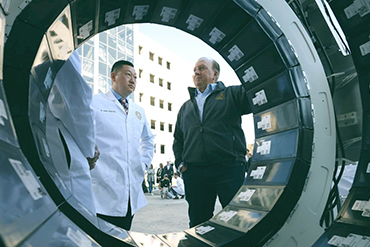
Can Belly Fat Promote Breast Cancer?
The link between obesity and cancer has been known for about 20 years. Jamie Bernard, a College of Human Medicine associate professor of Pharmacology & Toxicology, is studying exactly how obesity contributes to breast cancer and what can be done to prevent it.
Bernard, PhD, received a grant from the National Institute for Environmental Health Sciences in 2020 to study how adipose tissue, otherwise known as body fat, interacts with a common environmental chemical called Benzo(a)pyrene, or BaP, to increase breast cancer risk.

MSU brings better cancer diagnosis and treatment home to Michigan
At the corner of Michigan Street and Monroe Avenue along the “Medical Mile” in Grand Rapids, some of the world’s most advanced precision cancer treatments are beginning to take place inside the Michigan State University Grand Rapids Innovation Park.
Within the walls of the Doug Meijer Medical Innovation Building — a 205,000-square-foot facility in the innovation park dedicated to biomedical research and public-private partnerships — the medical innovation company Bold Advanced Medical Future Health welcomed the arrival of the nation’s first total-body PET/CT scanner for clinical use on patients. MSU’s partnership with BAMF Health accelerates cancer research through a pipeline of advanced clinical research combined with the latest technology.

Henry Ford Health + MSU Health Sciences funds five cancer research grants
Henry Ford Health + Michigan State University Health Sciences announced its funding of five cancer research grants of up to $100,000 each. These five grants follow an initial wave of funding from the partnership, in which 18 pilot grants of up to $25,000 each were funded in May 2022.
“We are proud to support the groundbreaking work of our dedicated researchers who are helping to advance the field of cancer medicine, reduce healthcare disparities and improve outcomes for patients with cancer,” said Ben Movsas, chair of the Health Sciences Cancer Committee and medical director of Henry Ford Cancer. “These highly impactful research initiatives, 40 percent of which directly address cancer disparities, will help us gain critical insights into some of the most challenging issues facing the cancer community today, which in turn will benefit patients and make a difference in many lives.”

Hickman family’s $6 million gift funds cancer research, creates endowed position
Alumnus Stephen Hickman (’64, Business); his wife, Sally; and their family — daughter Stephanie Hickman Boyse, a 1990 graduate of the College of Communication Arts and Sciences; daughter Tracy Hickman, who earned a degree in interior design in 1988; and Tracy’s spouse, Chad Munger, a 1988 graduate of the College of Arts & Letters — have come together to make a $6 million gift to support cancer research and treatment at Michigan State University.
